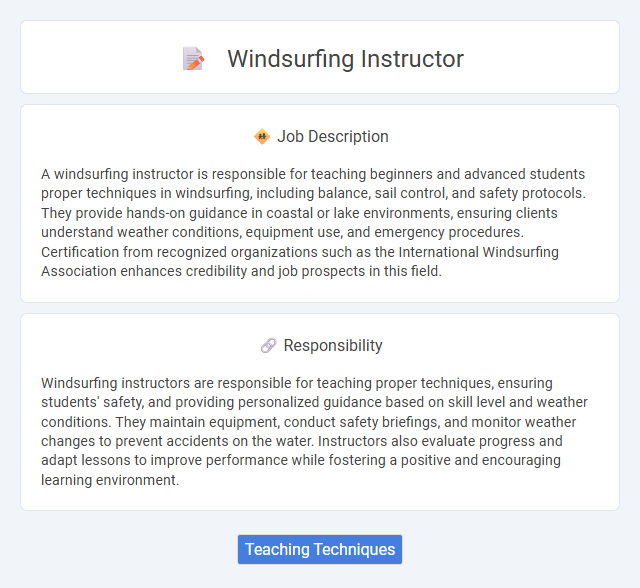
A windsurfing instructor is responsible for teaching beginners and advanced students proper techniques in windsurfing, including balance, sail control, and safety protocols. They provide hands-on guidance in coastal or lake environments, ensuring clients understand weather conditions, equipment use, and emergency procedures. Certification from recognized organizations such as the International Windsurfing Association enhances credibility and job prospects in this field.
Individuals with strong physical fitness and good balance are likely to be well-suited for a windsurfing instructor job, as the role demands frequent physical activity and outdoor endurance. Those comfortable in aquatic environments and capable of staying calm under changing weather conditions may find this position particularly fitting. People with strong communication skills and patience could also have higher chances of success, given the need to teach and guide students effectively.
Qualification
Windsurfing instructors must possess certification from recognized organizations such as the International Funboard Class Association (IFCA) or the Professional Windsurfing Association (PWA) to ensure safety and technical proficiency. Proficiency in both windsurfing techniques and water safety rescue skills is essential, along with strong communication abilities to effectively teach students of varying skill levels. Physical fitness and experience with diverse wind and water conditions further qualify candidates for this dynamic outdoor role.
Responsibility
Windsurfing instructors are responsible for teaching proper techniques, ensuring students' safety, and providing personalized guidance based on skill level and weather conditions. They maintain equipment, conduct safety briefings, and monitor weather changes to prevent accidents on the water. Instructors also evaluate progress and adapt lessons to improve performance while fostering a positive and encouraging learning environment.
Benefit
Windsurfing instructor jobs likely offer significant benefits such as flexible schedules and the opportunity to work outdoors in scenic locations, which can enhance physical wellness and mental well-being. There is a probability of gaining valuable skills in sports coaching and water safety certification, boosting professional credentials. Additionally, the role may provide social engagement and community building through teaching diverse groups of students.
Challenge
A windsurfing instructor position likely presents a significant challenge requiring quick adaptation to varying weather and water conditions. Mastery of teaching skills combined with strong physical endurance is probably essential to effectively guide students of different skill levels. Success in this role often depends on the ability to motivate and ensure safety while fostering confidence on the water.
Career Advancement
Windsurfing instructor positions offer rapid career advancement through skill development, certifications, and leadership opportunities within watersports schools and resorts. Gaining advanced coaching qualifications and specializing in competitive techniques can lead to roles such as head instructor, program coordinator, or training manager. Building a strong professional network and consistently demonstrating expert teaching skills enhances prospects for international training assignments and entrepreneurial ventures.
Key Terms
Teaching Techniques
Windsurfing instructors employ a range of teaching techniques including step-by-step skill demonstrations, hands-on guidance, and video analysis to enhance learner performance. Emphasizing water safety, balance control, and sail handling, they adapt lessons to individual skill levels and environmental conditions. Effective communication and motivational feedback help students rapidly progress from basic maneuvers to advanced windsurfing techniques.
 kuljobs.com
kuljobs.com